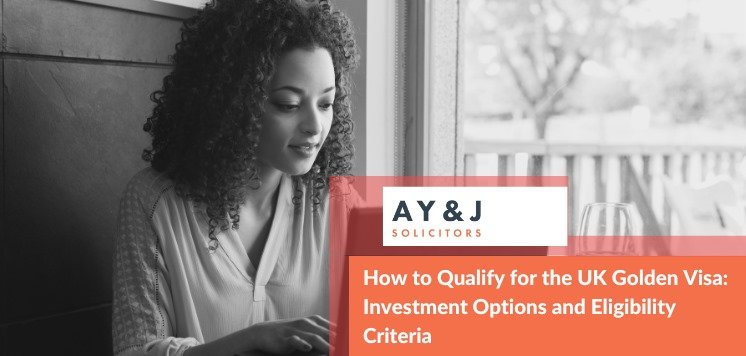The UK Golden visa, which is also known as the tier 1 investment visa, was one of the most attractive visa options for individuals getting residency in the UK. This visa not only allowed them residency but also allowed them to establish their business in the UK by investing a stipulated amount in the UK economy. But as of year 2022, the UK government had abolished the Golden Visa UK due to its misuse. This resulted in closing the doors of establishing business in the UK for some investors and entrepreneurs. But there is still an alternative and practical route instead of the route mentioned above: The UK Self-Sponsorship visa route. This route gives an outstanding opportunity to businessmen and individuals who wish to establish themselves and their businesses in the UK.
Why was the UK Golden visa closed?
The UK Golden visa came in light in the year 2008 to attract more of foreign investments in the UK. The basic requirement under this route was to invest a total sum of £2 million in UK government bonds, share capital, or loan capital in active and trading companies in the UK.
The chances of getting permanent residency also known as ILR (Indefinite Leave to Remain) increased if the amount was higher than the minimum investment amount.
Despite the fact that this route was popular, the Golden Visa was put under scrutiny for possible risk related to security and suspicious illegal financial activities. In February 2022 this route was closed and it marked the end of this investment-based business visa route.
But this does not mean at all that all the ways for the individuals are closed who want to establish their business in the UK. Rather the UK Self Sponsorship Visa is another trusted alternative that can suit your needs.
Explore the video below to uncover more information.
The Self-sponsorship visa route in the spotlight
The UK self-sponsorship visa route is not known much but it is a popular route that is in demand. For entrepreneurs and individuals who want to establish their business in the UK, this proves to be the best option.
It differs greatly from the golden visa, as this visa road does not require much investment.
Rather, it totally depends on your ability to start a legitimate business in the UK and sponsor yourself as an employee of the same business.
Some key features of the self-sponsorship visa route:
- No requirement of a job offer:
One of the most important advantages of this visa route is that you don’t require a job offer or someone to sponsor you. Rather, you can become your own sponsor by establishing a UK-based company.
-
Flexibility:
The self-sponsorship visa route does not limit you to specific sectors. And offers flexibility for individuals who want to invest in a wide range of businesses from tech startups to consultation services.
- A path to settlement:
Like the golden visa, the self-sponsorship visa route leads to permanent residency in the UK after 5 years. And it is- provided that you meet all the requirements by the Government of the UK. It also lets you bring your dependents to the UK further down the line.
- The financial requirement is low:
As you know, the golden required a hefty investment. But in the self-sponsorship visa route, you do not need to show that you have sufficient funds to establish and run your business. Which makes this option more accessible for individuals and business owners.
How do you qualify for a self-sponsorship visa?
Step 1: Start setting up a business in the UK
The very first step to get this visa is to establish a company in the UK. The business must be legitimate and have a clear business idea. It can be a new business or an extension of an existing business in the UK. You need to register your business with the company’s house and make sure you comply with all the UK regulations. You need to prepare a very detailed business plan that covers your objectives, your target audience the financials, and the strategy that you would be opting for.
You also need to have a business bank account in the UK that can support your financial transactions.
Step 2: Get a sponsor license.
After your company is established, the next step is for you to apply for a sponsor license. This license will allow your business to sponsor employees including you. To be able to qualify for a sponsor license, the business must meet requirements and rules which include that your company is actively trading and is compliant with the UK immigration laws that are set by the government of the UK. You need to submit the application to the UK home office with the documentation and required fee.
Step 3: Sponsoring Yourself
The moment you receive your sponsor license, you can assign a Certificate of Sponsorship to yourself. It is important to note that this document is important to apply for the visa.
After this, you need to give yourself a legitimate role in your company that aligns with the requirements of a skilled worker visa.
Step 4: Applying for a skilled worker visa
After you have got your Certificate of Sponsorship, you can go ahead and apply for a skilled worker visa. This visa is your key to living and working in the UK as an employer in your own established business in the UK. You need to submit evidence that you are qualified, have financial appropriate financial resources, have proficiency in the English language, and have a certificate of sponsorship. The visa applicated can usually take three weeks if you have applied outside the UK.
The closing of Golden Visa might have closed one chapter, but the UK Self Sponsorship visa route has opened many doors to opportunities. By establishing and setting up your business in the UK, and sponsoring yourself you can achieve your immigration goals but also contribute a lot in the UK economy. If you are considering establishing a business in the UK, this is the right time to go for the UK Self-Sponsorship visa route.


